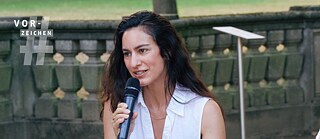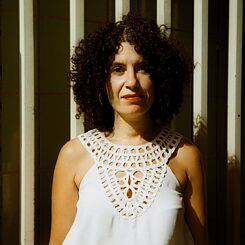Literature//Vorzeichen
Literary prizes and juries
Maryam Aras will be our guest for the next event in the series #Vorzeichen on October 2, 2024. Please join us for a discussion on the state of literary criticism, jury composition, as well as prizes and exclusion in the literary scene. Whose names are included in the running for awards? What is the most significant book of the year and more importantly: why?
This event will be co-moderated by Professor Ela Gezen of the University of Massachusetts Amherst and Dr. Maha El Hissy, the series curator. The conversation will be held in German and participation is free of charge.
Literary prizes draw attention to authors, translators, and publishers. But marginalized voices and independent publishers are frequently absent from the long lists for prestigious literary prizes. The reasoning provided for such absences is often that these awards honor literary work, not politics. However, systematic exclusion is not mere coincidence. Award nominations are never neutral; instead, they reflect existing power structures and the dominance of white gaze in the reception of art.
But if art is tied to social discourse, is a universal set of criteria for the evaluation of literature even possible? To what extent are the social aspects of literature such as precarious working conditions or other forms of marginalization in the literary scene taken into consideration—either directly or indirectly—when it comes to the evaluations of literary critics?
Maryam Aras is a literary scholar, critic, moderator, and independent author. Her essays and other writings have been published in Die Presse, Berliner Zeitung, Deutschlandfunk Kultur, and many others. Maryam is also a literary translator for Persian poetry and prose. Her work centers postcoloniality and the reception of BIPOC authors. Maryam is a jury member for various literary prizes, including the Leipzig Book Fair Prize and the Wortmeldungen Förderpreis. Her forthcoming book, Dinosaurierkind [Dinosaur Child] (Claassen 2025) develops a new narrative around her father’s generation in the transnational Iranian opposition working from Germany and explores their participation in the social movements of 1968.
Dr Maha El Hissy is an independent literary scholar and critic. In 2024, El Hissy is curating the event series #Vorzeichen [Accidental Portents] for the Goethe-Institut in Northwestern Europe. She is editor of a forthcoming anthology on the art and literature of immigration to post-war Germany with Verbrecher Verlag.
The online events are open to anyone interested in literature and are particularly recommended for German scholars, German culture specialists, students, publishers and translators. In addition to the six online lectures at the interface between literary studies and the publishing industry, the series includes eight conversations with authors plus book reviews that will be published on Instagram over the course of the year. Detailed information about the series as well as event announcements and recordings of events that have already taken place can be found here:
This event will be co-moderated by Professor Ela Gezen of the University of Massachusetts Amherst and Dr. Maha El Hissy, the series curator. The conversation will be held in German and participation is free of charge.
Abstract
Literary prizes draw attention to authors, translators, and publishers. But marginalized voices and independent publishers are frequently absent from the long lists for prestigious literary prizes. The reasoning provided for such absences is often that these awards honor literary work, not politics. However, systematic exclusion is not mere coincidence. Award nominations are never neutral; instead, they reflect existing power structures and the dominance of white gaze in the reception of art.
But if art is tied to social discourse, is a universal set of criteria for the evaluation of literature even possible? To what extent are the social aspects of literature such as precarious working conditions or other forms of marginalization in the literary scene taken into consideration—either directly or indirectly—when it comes to the evaluations of literary critics?
Bio
Maryam Aras is a literary scholar, critic, moderator, and independent author. Her essays and other writings have been published in Die Presse, Berliner Zeitung, Deutschlandfunk Kultur, and many others. Maryam is also a literary translator for Persian poetry and prose. Her work centers postcoloniality and the reception of BIPOC authors. Maryam is a jury member for various literary prizes, including the Leipzig Book Fair Prize and the Wortmeldungen Förderpreis. Her forthcoming book, Dinosaurierkind [Dinosaur Child] (Claassen 2025) develops a new narrative around her father’s generation in the transnational Iranian opposition working from Germany and explores their participation in the social movements of 1968.
Moderation
Ela Gezen is a professor of literature and cultural studies at the University of Massachusetts Amherst. Her current book project, Cultures in Migration: Turkish Artistic Practices and Cultural Political Interventions in West Berlin investigates the cultural practices of artists of Turkish heritage in West Berlin in the late 1970s and early 1980s.Dr Maha El Hissy is an independent literary scholar and critic. In 2024, El Hissy is curating the event series #Vorzeichen [Accidental Portents] for the Goethe-Institut in Northwestern Europe. She is editor of a forthcoming anthology on the art and literature of immigration to post-war Germany with Verbrecher Verlag.
#Vorzeichen
The lecture is one of six talks in the series #Vorzeichen. Whom, What and How we read. In cooperation with an academic institution, the online lectures will feature speakers from various fields, such as academia, publishing and translation, who will discuss the exclusion of texts and authors through canonisation processes and market pressure.The online events are open to anyone interested in literature and are particularly recommended for German scholars, German culture specialists, students, publishers and translators. In addition to the six online lectures at the interface between literary studies and the publishing industry, the series includes eight conversations with authors plus book reviews that will be published on Instagram over the course of the year. Detailed information about the series as well as event announcements and recordings of events that have already taken place can be found here:



